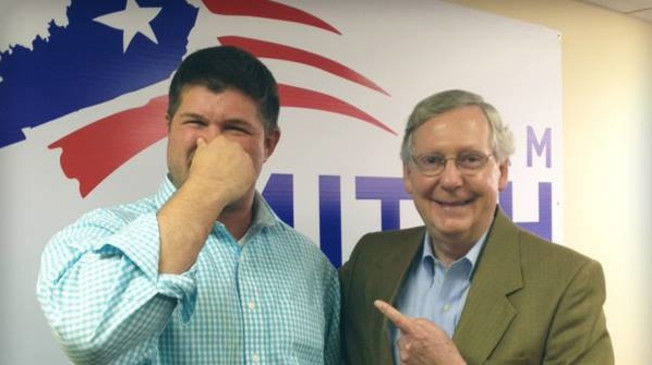Imagine for a moment if it had come out during the 2016 campaign or in the first year of the Trump presidency that GOP political operatives were accused of illegally funneling Russian money into the Trump campaign.
Now, some five years later, that’s precisely the accusation federal prosecutors are making in a new case in DC.
What took so long?
According to an indictment unsealed Monday in D.C. federal court, a pair of GOP operatives allegedly conspired to conceal their scheme — and siphon thousands of dollars in illegal foreign money from a Russian businessman into Trump campaign coffers.
All this took place as the national media and FBI scoured the Trump campaign for any potential source of Russian ties or, more importantly, infusions of Russian cash. Allegations like these would have been explosive and politically damaging to Trump.
But now, five years since some of the alleged crimes took place, the Justice Department decided to charge the case.
Former prosecutors and campaign finance experts told TPM that the delay was unusual.
“It seems like the kind of case that doesn’t require five years of investigation,” Barb McQuade, a former U.S. attorney, told TPM, adding that the allegations themselves didn’t suggest the kind of complicated financial dealings that may require years of probing to unspool.
“It seems like the transactions were finite and complete by, at the latest, early 2017. So it’s a fair question why someone did not charge this,” she added.
“When you’re dealing with high-profile people in a case like this, then it’s justified to be more suspicious of the timing,” Larry Noble, a former FEC commissioner, told TPM.
The Allegations
The indictment itself says that Jesse Benton, a Kentucky GOP political operative who helmed Sen. Mitch McConnell (R-KY)’s 2014 re-election campaign and who has worked closely with Sen. Rand Paul (R-KY), acted as a straw donor to siphon $25,000 into Trump Victory, a PAC formed by the RNC and the Trump 2016 presidential campaign.
Benton, who was later pardoned by Trump for his conviction in an unrelated campaign finance scheme, allegedly plied his connections to secure a photo op between Trump and a Russian businessman in Philadelphia on Sept. 22, 2016.
Prosecutors said that Doug Wead, a conservative author, helped Benton do that, and introduced him to the Russian. The person was allegedly a business partner of Wead’s, and was the source of the contributions. Prosecutors are silent on the identity of the Russian businessman, saying only that he was a business partner of Wead’s.
The Russian allegedly wired $100,000 from a Vienna bank account in September 2016, $25,000 of which Benton allegedly spent on a contribution to the Trump campaign in October 2016. Benton pocketed the remaining $75,000, the indictment alleged.
The Timing
It’s not clear why the charges in this case came five years after the conduct occurred.
Attorney General Merrick Garland said in June 2021 that Deputy Attorney General Lisa Monaco was reviewing “potentially problematic matters deserving high-level review.”
TPM asked a DOJ spokesperson whether the Benton and Wead indictment was a matter subject to Monaco’s review. The spokesperson declined to comment.
McQuade, the former U.S. attorney, argued that the indictment itself bore a few telltale signs that prosecutors had faced a delay, and that they may have been scrambling to file charges before the campaign charges hit their five-year statute of limitations.
Two counts in the indictment, relating to acting as a straw donor and facilitating a contribution by a foreign national, include a broad time range that, in this case, extends from September 2016 to July 2017.
McQuade said that while conspiracy charges tend to cover broad time ranges, substantive charges like contributions by a foreign national more typically pin the crime to a specific day or few days.
“That looks like an effort to squeeze the conduct into the statute of limitations,” she noted.
But why the delay that had prosecutors potentially bumping up against the statute of limitations?
Erin Chlopak, director of campaign finance strategy at the Campaign Legal Center, told TPM that the lack of civil campaign finance enforcement meant that the DOJ had to pick up more of the slack, but also that there was less monitoring of campaign finance disclosures by government authorities.
So it’s possible that the allegations weren’t known to DOJ until late in the game.
Another possibility for delay generally would be a complex case that presented prosecutors with hurdles to investigating the matter. But the Benton and Wead allegations are fairly straightforward: the Russian wired the money to Benton, who then reimbursed himself for the $25,000 campaign contribution with that money.
Delays often arise when defendants drag out an investigation through plea negotiations, adding time.
“There are a lot of reasons cases can be stalled,” Noble said.
But to McQuade, the timing — along with everything else that the country saw under the Trump administration over the past several years — suggests that something made the prosecutors “scramble” to file the case before the five-year limit began to run out this month. The allegations themselves went to the heart of what was under investigation from 2016 onwards.
“It advances the notion that Russia supported Trump, and we’ve seen that, not only in the Mueller indictments, the efforts by Russia to support Trump, but here again we have Russia business influence,” she said.










